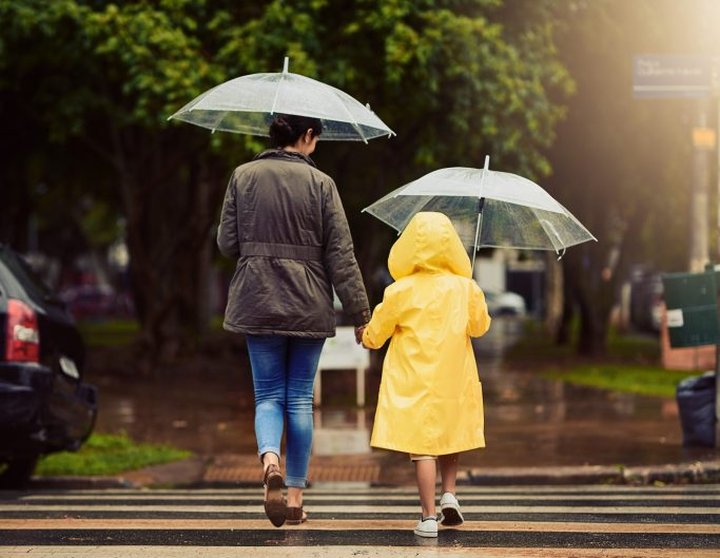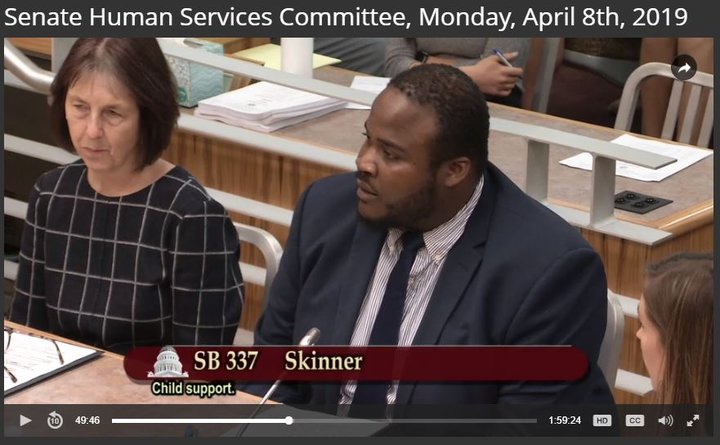
Under current California law, families using public assistance only receive the first $50 of child support payments. Under a bill on the governor’s desk, families with one child will receive $100 a month and those with two or more children will get $200. Photo: iStock.
###
When Ronnell Hampton was growing up, his father wrote a $600 check every month to pay his child support.
But only $50 of that amount actually made it to Hampton’s family; the rest was sent back to the government to repay the cost of public assistance.
The family could have used the extra cash, Hampton said. He recalled days with the electricity turned off, selling candy and pumping gas to make ends meet, and school outings he couldn’t go to because they didn’t have enough money.
“I wasn’t aware that my father was contributing that $600 because that money wasn’t coming to the household,” Hampton, now 31, said. “When I think of $600 additional into my household growing up, that would have helped out so much.”
Critics have long argued that California’s child support payback system for families using public assistance is overly punitive, disproportionately affects low-income families, and can drive a wedge between children and their parents.
Now, two bills on Governor Gavin Newsom’s desk could change the system for families like Hampton’s, ensuring that more money passes through to families using benefits, and that noncustodial parents aren’t charged interest on government-owed debt.
The bills, currently awaiting Gov. Newsom’s signature, would send more child support money to families receiving public benefits and eliminate interest on overdue child support payments owed to the government. They do this by taking aim at the way child support payments are collected from noncustodial parents and distributed to families using public assistance such as MediCal and CalWORKs.
Under California law, families using public assistance only receive the first $50 of child support payments, even if the noncustodial parent pays hundreds more each month. The rest of the money is sent to the government to reimburse it for the cost of benefits. This practice earns the state hundreds of millions of dollars each year: In 2018, the state collected nearly $370 million from parents’ child support payments to pay back the government for the cost of public assistance, according to the California Legislative Analyst’s Office (LAO).
Current policy also penalizes noncustodial parents who miss child support payments that are owed to the government. Late payments incur a penalty of 10% interest, one of the highest rates in the nation. Parents who miss them can have their driver’s licenses suspended, their wages garnished, and can be sent to jail.
But the median income of parents with child support debt owed to the government is less than $15,000 a year, according to a report from the San Francisco-based nonprofit Tipping Point. The report also concluded that most of the debt owed to the state is not collectable, often because the noncustodial parent can’t pay or lives out of state.
Proponents of the bills say the interest rate, penalties, and the limited amount of money that families on assistance receive, can end up reinforcing the cycle of poverty.
“Once it becomes a debt owed to the government, that money never gets sent to the child,” says Jessica Bartholow, a policy advocate with the Western Center on Law and Poverty, which co-sponsored the bills. “It’s kind of the original sin of the child support system we have in place today, which is, how do we call it a child support system where none of that money goes back to the child?”
The two bills lawmakers recently sent to Gov. Newsom’s desk intend to change that.
SB 337, introduced by state Sen. Nancy Skinner, D-Berkeley, would increase the amount of money families on public assistance receive in monthly child support payments and eliminate child support debt the state determines is not collectable. Under Skinner’s bill, families on public assistance with one child will receive $100 a month instead of the current $50 and families with two or more children will get $200.
Another bill, AB 1092 from Assemblyman Reggie Jones-Sawyer, D-Los Angeles, would end the practice of charging 10% interest on child support debt owed to the state as repayment for public assistance.
An earlier version of Skinner’s bill would have gone even further, directing 100% of child support payments to the family. That provision was ultimately removed amid concerns it would be too costly for the state, but Skinner says even the increase they did manage to get through — from $50 to $100 — can make a huge difference for families living in deep poverty.
“The cost of living in California is so high that while to many families something like $50 sounds like hardly a drop in the bucket, for a family that is counting every penny, $50 can mean a lot,” she says. “Fifty dollars can mean whether you eat, $50 can mean whether you’re on time with your rent. $50 can mean you’re paying off any type of bill that if you don’t pay, then starts to accumulate penalties or fines.”
The impact of debt can extend beyond finances. Researchers have found that the system can create friction between families, with noncustodial parents frustrated that more of their payments aren’t going towards their children, and custodial parents and kids confused and hurt about why they are receiving so little.
Other studies have indicate that relieving parents of their payback debt for public assistance can strengthen their relationship with their children and improve their lives.
A recent study from the Urban Institute, for example, tracked 32 parents participating in a San Francisco pilot project that paid off their government-owed child support debt. Researchers determined that the debt relief led to more consistent child support payments, with an 18-28 percent increase in payments among participants in the pilot project. Parents whose debt was paid off also reported reduced levels of stress and anxiety and had better credit scores, housing opportunities and employment outcomes, the researchers found, as well as improved relationships with their children and even their co-parents, after the debt was eliminated.
“It’s always been a question. If you get rid of debt, will people pay? And that’s what happened,” says Jamie Austin, senior director of insights and analytics at Tipping Point, which helped fund the Urban Institute study. “And I think for the insiders of child support, that was kind of proof or evidence that this kind of program relieving debt can work and it can establish a closer relationship between mother and father.”
Hampton, who advocated for Skinner’s bill and testified at one of its hearings, didn’t learn that his dad paid hundreds in child support each month until years after the fact, when the payback policy came up at a conference he attended. He was shocked. Then he called his dad, who confirmed it.

A frame of video of Ronnell Hampton’s testimony at a Senate Human Services Committee hearing in April 8, 2019. (Video frame from Senate hearing)
“Growing up, I just thought it was my dad not wanting to help,” he says, “versus not having the capacity to help. So for me It’s important to make sure that families that don’t have those kinds of experiences.”
###
Erica Hellerstein is a journalist at The Mercury News in San Jose working for The California Divide, a collaboration among newsrooms examining income inequity and economic survival in California.
CALmatters.org is a nonprofit, nonpartisan media venture explaining California policies and politics.
CLICK TO MANAGE